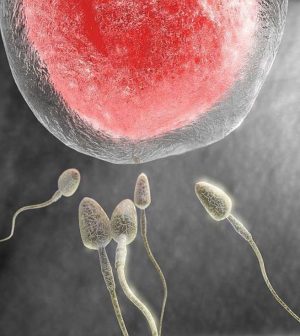- Could Your Grocery Store Meat Be Causing Recurring UTIs?
- Are You Making This Expensive Thermostat Error This Winter?
- Recognizing the Signs of Hypothyroidism
- 10 Strategies to Overcome Insomnia
- Could Artificial Sweeteners Be Aging the Brain Faster?
- Techniques for Soothing Your Nervous System
- Does the Water in Your House Smell Funny? Here’s Why
- Can a Daily Dose of Apple Cider Vinegar Actually Aid Weight Loss?
- 6 Health Beverages That Can Actually Spike Your Blood Sugar
- Treatment Options for Social Anxiety Disorder
Fertility Issues? Ovulation Tests Can Help, Study Finds

A new review of clinical trials with an eye toward successful conception affirms that timing is key when trying to get pregnant.
The review found that using urine ovulation tests to time intercourse improved both birth and pregnancy rates in women under 40 who had been trying to get pregnant for less than a year.
Using seven controlled trials involving more than 2,000 women or couples, the review found that timing intercourse around the fertile period using a urine ovulation test boosted the chances of pregnancy and live birth to between 20% to 28%, compared to 18% without using the tests.
“Many couples find it difficult to achieve a pregnancy, which can lead to concerns about their fertility,” said lead author Tatjana Gibbons, a researcher at Oxford University’s Nuffield department of women’s and reproductive health, in the United Kingdom.
“The finding that a simple and easily available urine test can increase a couple’s chance of successful conception is quite exciting because it can empower couples with more control over their fertility journey and could potentially reduce the need for infertility investigations and treatments,” Gibbons noted in a university news release.
Every month presents a narrow window for conception, because of the lifespan of the sperm and the release of the egg.
A woman can identify where she’s at in her menstrual cycle through urine ovulation tests, which are dipstick devices that can detect changes in hormones released into the urine. Other ways include calendar tracking, monitoring changes in cervical fluid and body temperature. An ultrasound can also identify when an egg is released.
The study findings were published Sept. 15 as a Cochrane Review.
“The high threshold of evidence required in a Cochrane review makes even this moderate quality evidence for the effectiveness of urine ovulation tests quite impressive, as well as surprising considering how long they have been available for,” said Dr. Christian Becker, of Nuffield department of women’s and reproductive health.
The study authors said results should be interpreted with caution because test manufacturers funded many of the reviewed studies.
Insufficient evidence existed to determine the effectiveness of other methods.
The review was conducted jointly with researchers from Oxford University, the Royal Berkshire Hospital in Reading and the Princess Anne Hospital in Southampton, all in the United Kingdom.
More information
The U.S. Centers for Disease Control and Prevention has more on infertility.
SOURCE: University of Oxford, news release, Sept. 14, 2023
Source: HealthDay
Copyright © 2026 HealthDay. All rights reserved.










